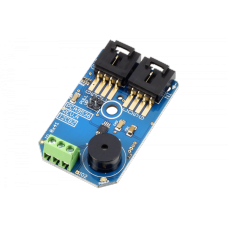PCA9536 I2C Digital 3-Channel Input Output with Buzzer I2C Mini Module
The PCA9536 is a general purpose 4-Channel digital I/O controller. In this design, we dedicated the last GPIO (GPIO.3) to a buzzer for alarm notification applications. The remaining three GPIO pins are available for user applications. The address of the PCA9536 is fixed at 0x64, so only one of these devices may be attached to a single I2C port. The PCA9536 has the ability to source up to 85ma of current, not to exceed 50ma per GPIO, which is more than twice the rating of many similar devices we have worked with. The unusually high current delivery per output makes the PCA9536 ideal for driving LEDs, buzzers, and other small circuits without the need for specialized switching circuitry.
All I2C Mini Modules are designed to operate at 5VDC. Using a convenient 4-Pin plug, devices can be daisy chained onto the I2C Bus, eliminating the need for soldering. Simply plug together the devices you need for your next automation application. Pull-up resistors are included with all NCD master devices. If you are wiring in your own I2C port, on-board 4.7K jumper-selectable pull-up resistors are available for convenience purposes.
What is the NCD I2C Interface?
NCD is the creator of plug and play modular hardware using the NCD I2C Interface connector standard. NCD I2C devices allow you to chain together several devices on the I2C bus, and communicate to each device individually at high speed (subject to the limitations of I2C). The NCD I2C Interface uses a standard 4-Pin I2C Input and I2C Output connector. NCD I2C devices communicate 5V I2C data and provides 5V DC power through this connector. NCD I2C devices use standard I2C communications for all data transport, which is supported by nearly every microcontroller in production today. The NCD I2C Interface is strictly a 5V standard, which is ideal for transport across longer cables. NCD I2C devices always include a 6″ (152mm) 4-conductor I2C cable. NCD I2C Mini Modules always include a 3″ (76mm) 4-conductor I2C cable. Cables and connectors are available separately for designers who would like to include their own NCD I2C Interface into their designs.
Plug and Play Connectivity
NCD I2C devices will plug in to any available NCD I2C Output. This includes just about everything we make in the NCD IoT Category, including all NCD IoT devices. We also manufacture a wide range of I2C adapters that make it easy to plug NCD I2C Devices directly into most computing platforms. The NCD I2C Interface adapters are available for Arduino, Banana Pi, BeagleBone, Bluz, C.H.I.P., ESP8266, Onion Omega, Particle Photon and Electron, PyCom, Raspberry Pi, 2, 3, and Zero, and Windows. We are always working to add new platform support for NCD I2C devices. NCD I2C Interface devices are compatible with just about everything in the microcontroller industry.
Unlimited I2C Expansion
Based on our plug-and-play I2C interface standard, all NCD I2C devices are equipped with a I2C output port, making it easy to expand to a wide variety of sensors, current monitors, relay controllers, PWM controllers, and much more! We are always designing new expansions for our modular plug-and-play I2C framework. We are dedicated to building a product line of interconnected devices to simplify all forms of automation. Re-use or upgrade your hardware in seconds by selecting the modules that best fit your needs, and chaining them together using the included I2C expansion cables!
Powering NCD I2C Interface Devices
Some NCD I2C devices require a external power supply, others may be powered through the 4-Pin I2C bus connector at 5VDC, and other devices are jumper selectable between external and I2C bus power. All I2C mini modules are powered through the 5V I2C bus connector, greatly simplifying connectivity.
Features
- I2C Controlled Buzzer
- 3 User Configured GPIO Pins
- 50ma High-current outputs
- One Device per I2C Port
- I2C Mini Module Footprint
- Modular PCA9536 Breakout Board
Enter the code in the box below:



